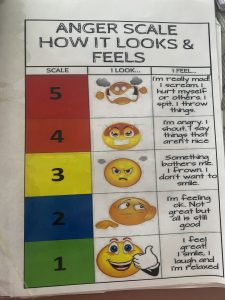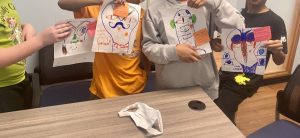Competency 7 Assess individuals, families, groups, organizations, and communities
Within my social work practice, I understand that assessment is an ongoing component of the dynamic and interactive process of social work practice. Social workers understand theories of human behavior and the social environment, and will critically evaluate and apply this knowledge in the assessment of diverse clients and constituencies. Social workers understand how their personal experiences and affective reactions may affect their assessment as well as decision-making.
7.1 Formulate comprehensive assessments, using a variety of diagnostic classification systems.
Course Evidence: In my Clinical Assessment and Diagnosis I course, I had the opportunity to do an assignment that assessed a client with Bipolar Disorder based on the diagnostic criteria from the DSM-5. This required me to use the DSM-5 to match up the information gathered from the case videos and match it with a diagnosis. This not only assisted me with getting familiar with a disorder, but it also helped me learn to correctly write out a diagnosis. To view the completed assignment, click here and refer to page 1: Bipolar Disorder Written Assignment.
Field Evidence: At my practicum, we utilize different ways to assess how students are doing and make them feel valued, as well as seen and heard. As I am given a student list from teachers based upon their needs, I am able to conduct check-ins and utilize the temperature assessment scale (pictured below). This assists me as a practitioner as I can better assess school and student needs. Upon meeting the student(s), I would always begin with the temperature assessment scale, by using the anger scale form. This identified how students feel at the moment, and informs the direction of the session.
7.2: Design and implement organizational and/or community assessments.
Course Evidence: In my School Social Work Core Concepts class, I was able to visit both a public and private school and assess the school based on several categories and noting the differences and needs in each school system. After visiting the schools and speaking with the school social worker and school guidance counselor, I was able to compile and write up my assessment as a paper. This assisted me in understanding the importance of assessments, as well as how differing private and public-school systems are. To view the completed paper, click here: School Visit.
Field Evidence: In one of my small groups which consisted of a group of 6th grade boys, we focused on anger management and conflict resolution. Before the session I used the Conflict Resolution Worksheet to assess the issues students would bring to the group and identify, if possible, any roots of the problems presented. It was imperative that I clearly defined the purpose of the assessment that would inform the specific goals and objectives I wanted to see them achieve in the session. The Conflict Resolution Worksheet can be found here.

Skills Used: Throughout this competency, I demonstrated skills of observation, engagement, documentation, connectedness, communication, as well as critical thinking.
Knowledge Used: Several courses such as Clinical Assessment and Diagnosis I and Advanced Administration Program Development as well as knowledge of the DSM-5 assisted me throughout this competency.
Values Present: Throughout this competency, many values were utilized such as the dignity and worth of the person as well as the respect of others. It is also imperative to incorporate the value of service into every interaction with clients.
Cognitive Processes Used: Research, identifying, and defining information were demonstrated when matching and connecting DSM-5 diagnosis’ with symptoms. Other processes were utilized such as interpreting information and coming up with a plan moving forward.
Affective Processes Used: Reviewing and researching the DSM-5 as well as reviewing case videos assisted me in concluding an accurate diagnosis. Identifying strengths, weaknesses, opportunities, and threats were also imperative in gauging organizational strengths.
Theoretical Foundation: Dilution Effect was the theory behind many practices within this competency. This theory demonstrates how we as humans have a tendency to assess based on stereotypes rather than accurate information. This is why it is so important to utilize best practices such as referencing the DSM-5 and allowing others to share vital information, rather than judging or stereotyping.